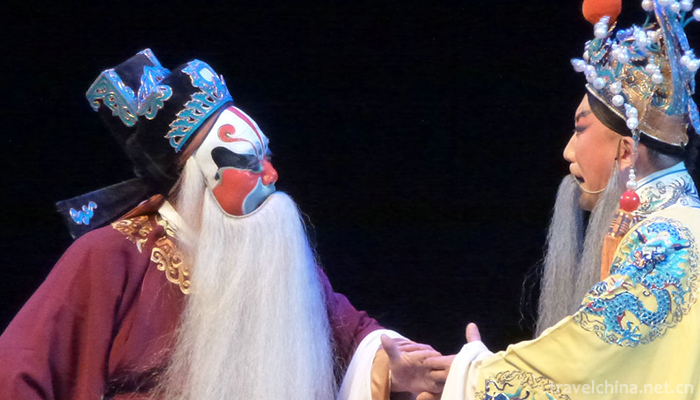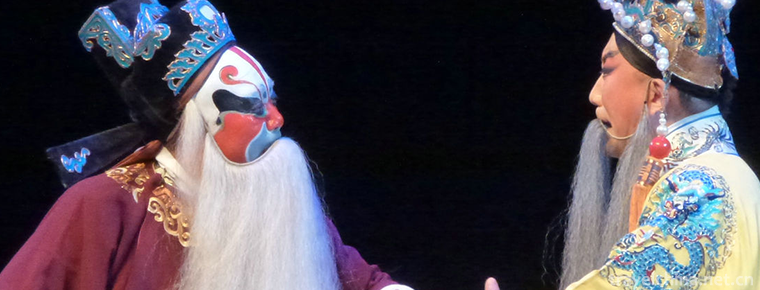Baoding old tune
Baoding old tune
Baoding old tune, also known as old tune bangzi, is one of the traditional operas with a long history in Hebei Province and a national intangible cultural heritage. At first, it was a popular Hexi tune in the Rural flower fairs around Baiyangdian. During the Qingdaoguang and Xianfeng years, the opera had taken shape. In the early period, the old tunes should be mainly composed of "Sheng" and "Jing". The two lines of "Sheng" and "Jing" are divided into two branches, singing the old tunes together, so they are called "old tunes". In addition to Baoding, it has its footprint and influence in Cangzhou, Hengshui, Shijiazhuang, Zhangjiakou and parts of Beijing, Tianjin and Shanxi.
brief introduction
Baoding Old Tune is one of the traditional operas in Hebei Province of China. Baoding Old Tune is a unique opera vocal opera.
The old tune has a broad mass base and is a tune that the local people often hum orally. Therefore, there was a saying among the people that cooking can not be done without cooking stoves and listening to operas can not be done without the old tune. The old tune has been performing in Beijing four times, and has been praised by the people, leaders and experts in the capital. Leading comrades of the Central Committee once encouraged him to say, "Baoding has treasure and the old tune is not old".
Baoding Old Tune has a history of about two or three hundred years. It was born in Yuan Dynasty. It will be popular in Hexi Tune, a traditional folk song of Yanzhao in the next year. It appears as a grand drama and is good at performing the real robe and belt play mainly composed of Laosheng and black-red-pure actors. Around 1884, the former artists represented by Shengxing actor Han Dacang (Ba Zhou Hong), initiated the forerunner of the old tune; around 1918, Zhou Fucai, a famous old student, set his mind on reforming and pushing the old tune art to a new stage with such dramas as "Transferring the Colonies" and "Advising the Army"; after the founding of New China, new artists emerged in succession, both in performance and in voice. New developments have been made.
After Pan Yang Lawsuit and Loyal Qianqiu were made into films, the influence of the old tune spread to the whole country.
Artistic characteristics
Baoding Old Tune is one of the local operas with a long history in Hebei Province, and it is also a unique local opera voice opera in Baoding. In the early period, the old tunes should be mainly composed of Sheng and Jing, while Sheng and Jing should be separated into two lines, singing the same old tune, so they are called old tune. They are different from Hebei Bangzi, so they are called old tune Bangzi, that is, the old tune opera. It is of certain positive significance to the study of the origin, formation and development of local operas, the history of the development of local ethnic groups, the history of the development of culture and art, and even the customs and customs.
The History of Baoding's Old Tune
Baoding old tune has a history of about 2300 years. It was born in the Yuan and Ming dynasties. It was popular in Yanzhao folk song "Hexi tune", and then appeared as a grand drama. It was good at performing costume-belt drama mainly composed of Laosheng and black-red-and-pure-acting. In the eighties of the nineteenth century, there were some former artists represented by the star actor Han Dacang (Bazhou Hong), who pioneered the old tune. In the early twentieth century, Zhou Fucai, a famous veteran, pushed the old tune art to a new stage with such dramas as "Transforming the Pirates" and "Advising the Army".
In the course of its development, the old tune has been influenced by the local high school and Hebei Bangzi, and absorbed the essence of the local rap art. It emerged in the Qing Guangxu period (1875 - 1908), and began to enter the city until 1930s.
After 1949, the old opera troupe specializing in Gaoyang, Dingxian and Fuping Equality was established in Baoding area. The old opera troupe in Baoding area has performed in Beijing for many times, and has been praised by Comrade Deng Xiaoping as "Baoding has treasure and the old tune is not old". In 1960 and 1980, the troupe produced and performed two excellent plays, Pan Yang Suit and Loyal Qianqiu, which were filmed and released nationwide. Famous artists include Cui Chengtian, Liu Shouqian, Xin Qiuhua and Wang Guanying. Since the new era, the old tune has created a large number of excellent operas such as "Sun Menstruation Day" and "Rejecting Ma Ling", which have won awards for many performances both inside and outside Hebei Province, and become one of the most popular operas for rural audiences in Hebei Province, especially in the middle of Hebei Province.


-
2.Xishuangbanna Primitive Forest Park
Xishuangbanna Primitive Forest Park, located in the east of Jinghong and north of Lancang River, is 8 kilometers away from the seat of the state capital.
Time 2019-02-25 -
3.Little wild goose pagoda
Xiaoyan Pagoda is located in the Jianfu Temple of Anrenfang, Chang'an City, Tang Dynasty (now the southern suburb of Xi'an City, Shaanxi Province), also known as the "Jianfu Temple Pagoda".
Time 2019-02-25 -
4.Caogao Gong and drum in northern Sichuan
Licao Gong and drum in northern Sichuan is a kind of traditional folk music. It mainly distributes in four counties and three districts of Guangyuan City, Sichuan Province
Time 2019-04-18 -
5.Da Xian Opera
Daxian opera is a local traditional drama in Huaxian and Puyang counties of Henan Province, and one of the intangible cultural heritage at the national level. The singing music of Daxian opera belongs
Time 2019-04-23 -
6.Alpine Hand in Hand Dance
"Hand-in-hand dance" is a kind of self-entertainment dance with the longest history and widespread spread spread among the folk dances of the mountain nationality. During the wedding and fes
Time 2019-04-30 -
7.Blue Clip Valerian Skills
Blue clip valerian technology, the local traditional printing and dyeing technology of Wenzhou City, Zhejiang Province, is one of the national intangible cultural heritage.
Time 2019-05-11 -
8.Legend of Mencius Mother and Godson
Legend of Meng Mu and Godson, Zoucheng local traditional folk literature, Shandong Province, one of the national intangible cultural heritage.
Time 2019-06-04 -
9.Shandong drum
In addition to the book drum, the musical instruments of Shandong drum were initially beaten with two pieces of plough and plough, and then two pieces of iron and copper were used, accompanied by thre
Time 2019-06-13 -
10.Pottery Firing Techniques
Pottery refers to the clay as the body, processed and shaped by hand, wheel system, moulding and other methods, and baked at high temperature of 1000-1200 degrees or so. The production process of pott
Time 2019-06-18 -
11.Huahu Lake
Huahu is located on the 213 national road between Ruoergai in Sichuan Province and Langmu temple in Gansu Province. It is a natural Haizi on the grassland of GER dam. Geer dam is the second largest grassland in China after Hulunbeir Grassland
Time 2020-11-07 -
12.Main scenic spots in Luzhou
Located in Luzhou city. It was built in the 18th year of Shaoxing in the Southern Song Dynasty (1148), in the year of Hongzhi of Ming Dynasty (1488-1505), in the 14th year of Guangxu of Qing Dynasty (1884) and in 1985, and has been well preserved.
Time 2020-12-14